Ask a question from expert
Understanding Ethics and Business Ethics
41 Pages25781 Words461 Views
Added on 2019-09-22
About This Document
This article discusses the basics of ethics and business ethics, including normative standards, fairness, and justice. It also explores the challenges businesses face in developing ethical standards and the importance of personal ethics in avoiding ethical breaches. Examples of ethical breaches in school and business are provided.
Understanding Ethics and Business Ethics
Added on 2019-09-22
BookmarkShareRelated Documents
The chapter’s opening “Consider...” teaches us that often we look at what compa- nies and business executives say and do and the fact that the companies are doing well, and assume thatthey must all have high ethical standards. The quotes are ironic because these individuals and/or their companies then crossed the ethical lines they touted as standards.We look at these individuals’ behaviors and wonder why they thought they could get away withtheir poor ethical choices, or why they believed they were immune from the laws and our ethical standards. We like to think of ourselves as so different from those who cross ethical and/or legal lines. But all of them were col- lege graduates, nearly all with business degrees. All of them were respected by their friends and were active in community projects and institutions.These individuals were “good” people, but they lost sight of personal ethics, business ethics, and the importance of ethics in success. Before they committed their business crimes, the worst that could have been said about many white-collar criminals who are serving 6-month to 25-year prison sentences is that they had parking and speeding tickets. Keeping ethics with us, in life and in business, can help us avoid the kinds of mis- takes that so many bright and capablebusinesspeople have made. But, we wonder, what are ethics? How do we know when we have them? How do we keep them when we face pressures, whether on an important exam or in meeting the quarterly numbers or our sales quota at work? This chapter answers these questions.27
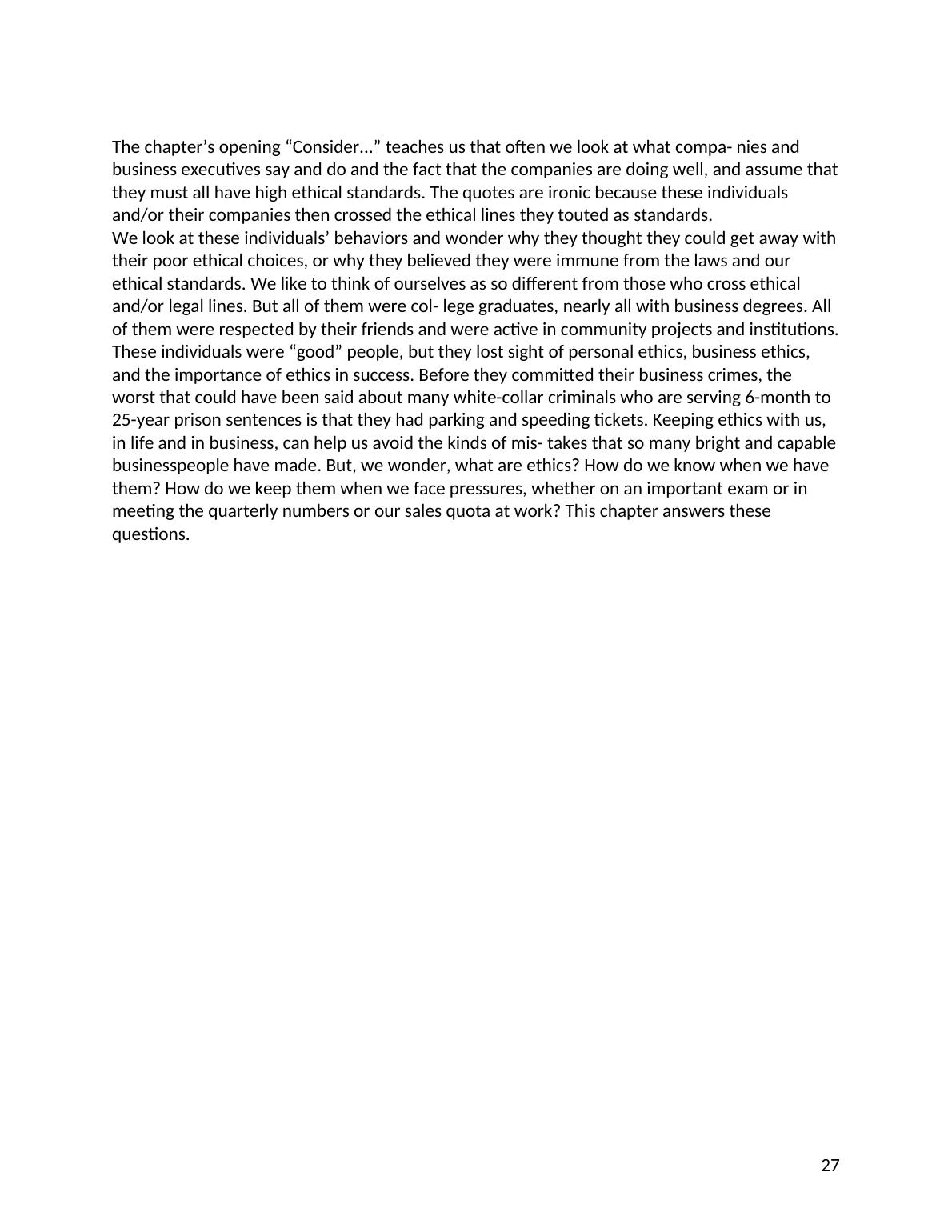
-1 What Is Ethics?When we learn that the Government Services Administration (GSA) held a meeting at a Las Vegas hotel at a cost of nearly $1 million to taxpayers, we label that conduct “unethical.” When we read that Jonah Lehrer, a young and rising star writer at the New Yorker fabricated quotes from Bob Dylan, we use the term unethi- cal. When we learn that Beyoncé may have lip-synced “The Star-Spangled Banner” at the 2013 presidential inauguration, we feel that we have been duped.2-1a “IT’SJUSTNOTRIGHT!”We read about these types of situations in the newspaper each day. From politics to journalism to business to our favorite sports and Hollywood icons, references to ethics run through the stories. But we also face ethical dilemmas ourselves. Two students purchase tickets at a theaterto see Lincoln, and when they emerge from the theater they realize they are in an open area with access to other theat- ers. If they wanted to, they could slip into Zero Dark Thirty or another movie without paying for another ticket. “Who’s to know?” they might think. “Holly- wood makes too much money anyway.” “It doesn’t really hurt anyone.” These thoughts are similar to those that may have run through the minds of the GSA administrators, the young writer, and the singer who did not analyze the risk factors in their conduct. Although we may believe we are different from business executives and others involved in scandals, we all face ethical dilemmas each day. Do I tell the clerk that he gave me too much change? Do I tell the lender on my loan application that my salary was just cut 25 percent? Do I go back to pay for the laundry detergent that slipped through on the bottom of my cart? Do I do what my boss says when he tells me to write a fake review online for our com- pany’s services? Do I tell a potential buyer of my car about the hairline crack in the engine block? Do I tell my clients that I am selling off the investments I am trying to get them to buy?The fact pattern changes slightly. The parties’ names and the subject matter vary, but the ethical issues are the same. Some conduct is more harmful, such as those situations in which a criminal statute is violated. Still, regardless of the law, we look at the conduct of government employees, the writer, the students in the theater, the company employee writing reviews, andthe seller of the car, and we conclude, “It’s just not right!” We probably agree that they all behaved unethically. We may not be able to zero in on what bothers us about their conduct, but we know an ethics violation, or an ethical breach, when we see one.2-1b NORMATIVESTANDARDS:HOWWEBEHAVETOKEEPORDERBut what do we mean when we say that someone has acted unethically? Ethical standards are not the standards of the law. In fact, they are a higher standard. Sometimes referred to as normative standards in philosophy, ethical standards are the generally accepted rules of conduct that govern society. Ethical rules are both standards and expectations for behavior, and we have developed them for nearly all aspects of life. For example, no statute in any state makes it a crime for someone to cut in line in order to save the waiting time involved by going to the end of the line.2 But we all view those who “take cuts in line” with disdain. We sneer at those cars that sneak along the side of the road to get around a line28
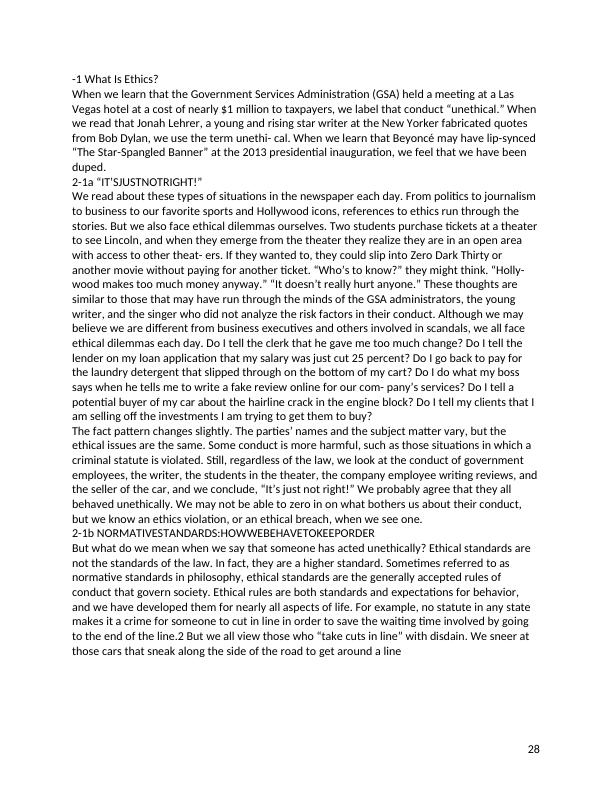
of traffic as we sit and wait our turn. We resent those who tromp up to the cash register in front of us, ignoring the fact that we were there first and that our time is valuable too.2-1c LINE-CUTTINGANDETHICSIf you have ever resented a line-cutter, you understand ethics and have applied ethical standards in life. Waiting your turn in line is a societal expectation. “Wait- ing your turn” is not an ordinance, a statute, or even a federal regulation. “Waiting your turn” is an age-old principle developed because it was fair to proceed with first in time, first to be served. “Waiting your turn” exists because large groups wait for the same road, theater tickets, or fast food at noon ina busy downtown area. We recognize that lines ensure order and that waiting your turn is the just way to allocate the limited space and time allotted for the traffic, the tickets, or the food. “Waiting your turn” is an expected but unwritten behavior that plays a criti- cal role in an orderly society.So it is with ethics. Ethics consists of those unwritten rules we have developed for our interactions with each other. These unwritten rules govern us when we share resources or honor contracts. “Waiting your turn” is a higher standard than the laws passed to maintain order. Those laws apply when individuals use physi- cal force or threats to push to the front of the line. Assault, battery, and threats are forms of criminal conduct for which the offenders can be prosecuted. But the law does not apply to the stealthy line-cutter who simply sneaks to the front, perhaps using a friend and a conversation as a decoy. No laws are broken, but the notions of fairness and justice are offended by one individual putting him- or herself above others and taking advantage of others’ time and position.Because line-cutters violate the basic procedures and unwritten rules for line formation and order, they commit an ethical breach. We don’t put line-cutters in jail, but we do refer to them as unethical. Other examples of unethical behavior also carry no legal penalty. A married person who commits adultery does not com- mit the type of crime that lands you in jail, but does create a breach of trust with his or her spouse. We do label their conduct with adjectives such as unfaithful, and even use a lay term to describe adultery: cheating.Speaking of cheating, looking at someone else’s paper during an exam is not a criminal violation. If you cheat on a test, your professor may sanction you and your college may impose penalties, but the county attorney will not pros- ecute you for cheating. Your conduct is unethical because you did not earn your standing and grade under the same set of rules appliedto the other students. Just like the line-cutter, your conduct is not fair to those who spent their time studying. Your cheating is unjust because you are getting ahead using someone else’s work.These examples of cutting in line, committing adultery, and cheating on exams bring certain common adjectives to our minds: “That’s not fair!” “That was dishonest!” “That was unjust!” You have just defined ethics for yourself. Ethics is more than common, or normative, standards of behavior. Ethics is honesty, fairness, and justice. The principles of ethics, when honored, ensure that the playing field is level, and that we earn our achievements by using our own workand ideas. Being ethical means being honest and fair in our interactions with each other , whether personally or in business 29
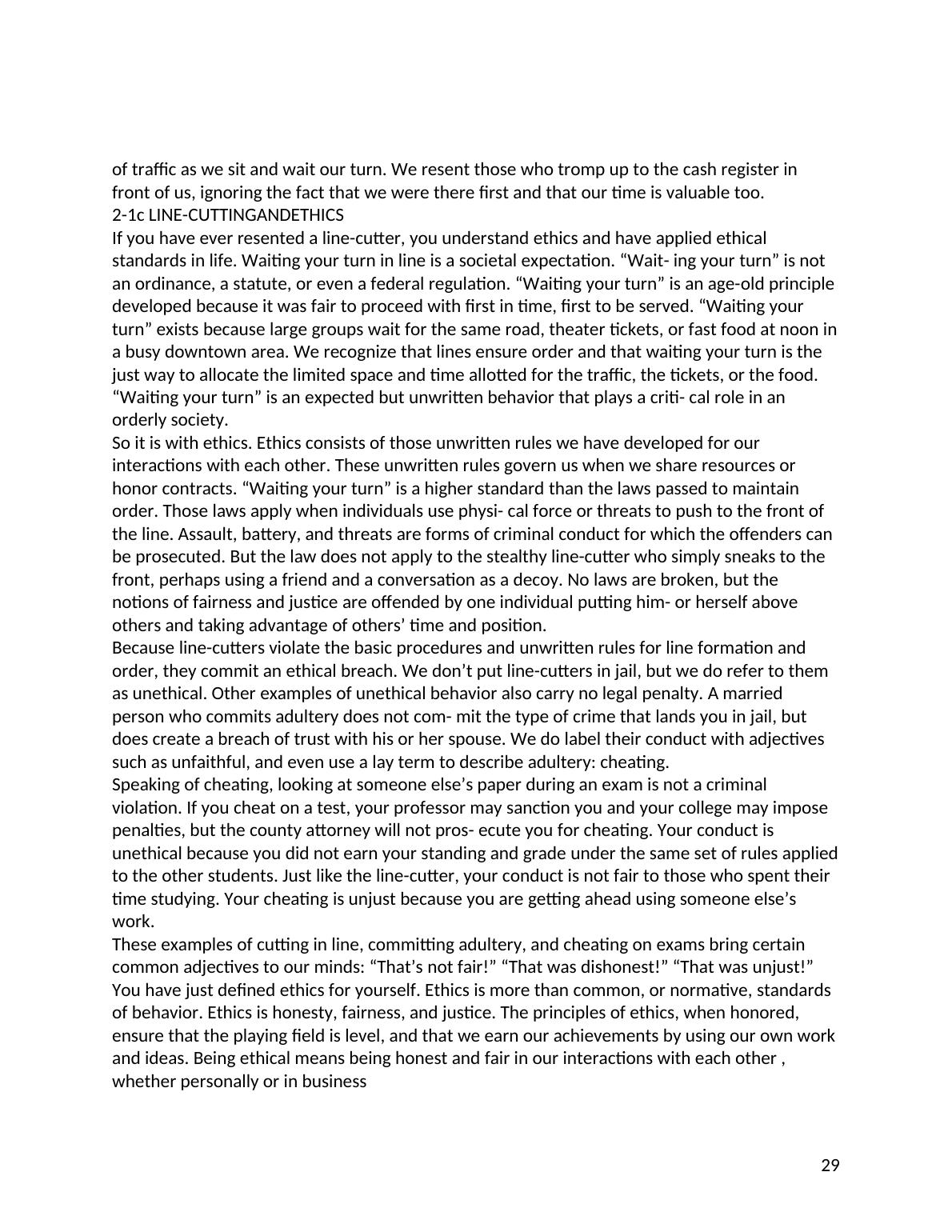
For theRe: A State of the Union Manager’s Deskon Academic EthicsEthics is not so difficult to understand, but it is difficult to practice. Data are available on the ethics of everyone from school-age children to graduate school students. In 1992, the Josephson Institute found that 61 percent of high school students reported that they had cheated at least once during a school year. By 2008, that num- ber had risen slightly to 64 percent, but then fell to 49 percent in 2012.3 According to the Center for Academic Integrity, about 75 percent of college students confess that they have cheated in some way in college.4 The rate for graduate students is 50 percent. They describe tak- ing notes and answers into exams, copying others’ work,Consider...downloading and buying term papers from the Internet, and not contributing to team projects but still receiving credit for them. Graduate students at Columbia Univer- sity extended the time clock for an online exam. Harvard Business School candidates tapped into the school’s admission database. Thirty-four students at Duke’s Fuqua Business School faced discipline for collaborating on a take-home exam. Several New York high school students faced criminal charges related to a cheating conspiracy on SAT exams. One student took the exam for 20 students, who paid him an average of $2,500 for his efforts at scholastic identity deception.Why do we worry about ethics in school? What is the point of teaching young people to be honest? Why do we impose penalties for cheating? How does cheating affect those who do not cheat? What are some of the long-term consequences if those who cheat are permitted to pass courses, graduate with honors, and pursue careers in their fields? What happens when the 75 percent of those who admit cheating in college reaches 100 percent?2-2 What Is Business Ethics?Many have referred to “business ethics” as an oxymoron. The little jibe suggests that it is impossible to be in business and be ethical. Some see the pursuit of profit as being at odds with ethics. However, the term business ethics is actually a complex one with many layers of meaning. The first layer consists of basic values (covered in the following section) such as being honest, keeping promises, and not taking things that do not belong to you. Another layer consists of notions of fairness (also covered in the next section) such as how we treat others, including customers and employees who report to us. Still a third layer consists of issues relatedto how a business interacts with the community, the environment, and its neighbors.The three layers of business ethics bring back into the purely quantitative mod- els of business the elements of a fair playing field. Business ethics involve the study of fairness and ethical standards amidst the pressure of earning a profit and providing returns to shareholders and others who have invested in the business.A business faces the special problem of having to develop ethical standards for a group of people who work together toward the common goal of profit for the firm. Individuals in the group have personal ethical standards, but too often employees find that the ethical standards imposed by managers at the top of a company result in possible harm to those at the bottom orto others outside the30
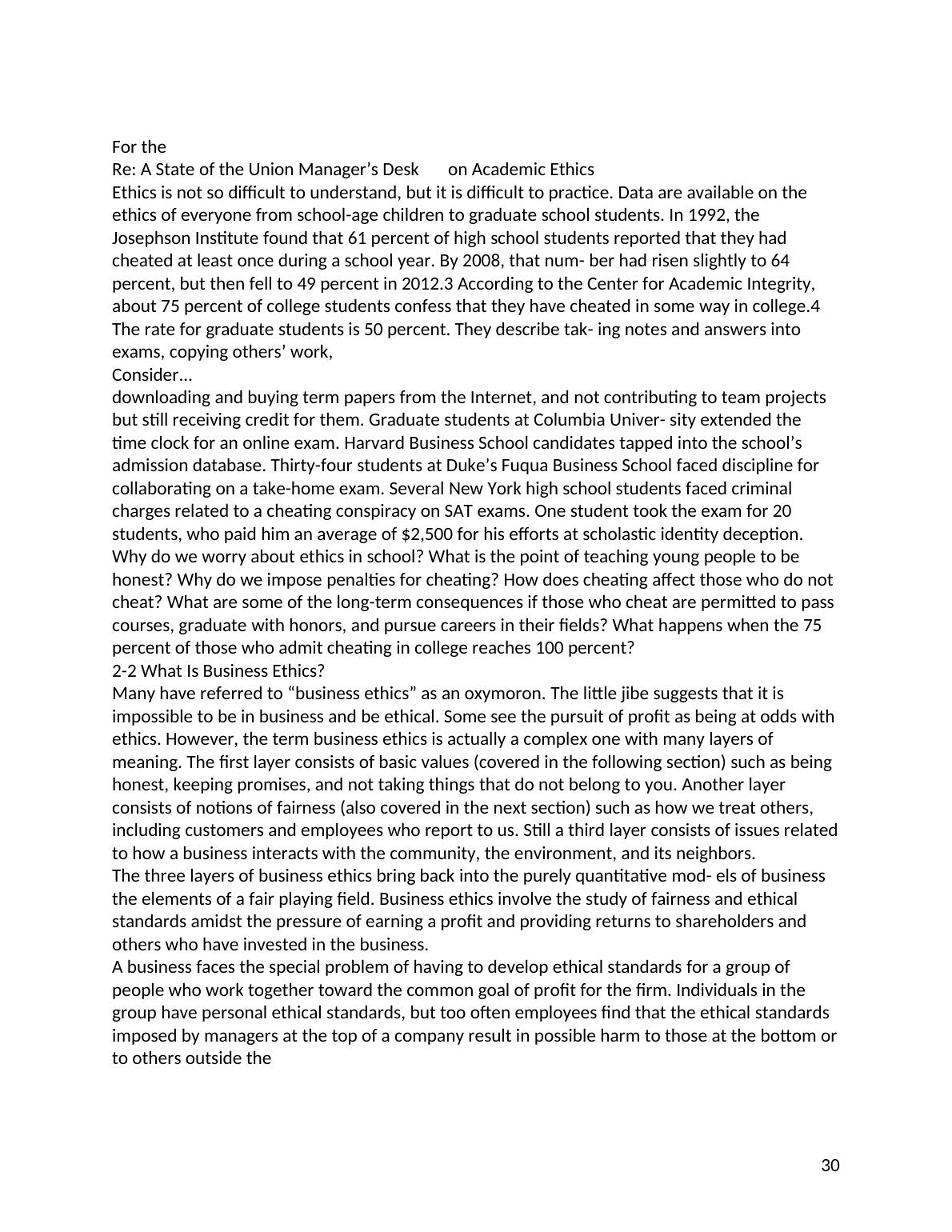
Ethical IssuesGerry Roscoe was the “Outstanding Graduating Senior” for the class of 2013 at State University.By tradition, the graduate chosen for this honor speaks at the commence- ment ceremonies for the university. Gerry was scheduled to give the student commencement address and had a job awaiting him on Wall Street at one of the nation’s largest investment banking firms.Jill Swain and Eric Bourdeaux were also graduating seniors who knew Gerry. Jill and Eric knew that, at least twice, Gerry had taken exams for others. One was a final exam during their sophomore year. The class was an economics course with 500 students. The exam was held in alarge lecture hall and proctored by graduate students. ID was not required, and Gerry took the exam twice, once for his section and at another time for a friend who was having trouble with the course. Without a B on the mid-term, Gerry’s friend would have failed the course and lost his scholarship. The second instance involved a final exam in finance. Finance 300 had been taught in sections of 50 students, but a common finalwas given with, again, 500 students in the room. The exam was proctored by one finance professor and graduate students. Gerry had taken Finance 300 one year before his girlfriend, Anissa Foulger, had, and she struggled through the course. She needed a B on the final exam in order to pass the course. If she did not pass, she jeopardized her transfer to a college in New York upon Gerry’s graduation and employment there. Jill and Eric saw Gerry enter the common final for Finance 300, and he explained that he was taking the final for Anissa: “You understand.Everything is off if she doesn’t make it through. She doesn’t need this stuff. She is going into advertising. I can take it for her and she’ll get her B.”If you were Jill or Eric, what would you have done at the time of the exams? What would you donow that Gerry has been given this “Outstanding Graduating Senior” honor? Does his dishonesty really hurt anyone? Wasn’t Gerry just being noble by taking the exam for his friend? For his girlfriend? Is it any of your business? How is anyone harmed by what Gerry did?firm. An employee may feel compelled to resolve the conflict between loyalty to an employer and the performance of an illegal or unethical act ordered by that employer by simply followingthe employer’s direction. In other words, in devel- oping standards of business ethics, an employee has personal economic interests in continuing employment that may compromise personal ethical standards. Busi- nesses face the additional challenges of developing business standards that are consistent with individual standards and helping employees understand that their personal standards of honesty and fairness need not be different at work. To accomplish this meshing, business managers should understand the various sources of ethical standards.2-2a ETHICALSTANDARDS:POSITIVELAWANDETHICSEthical standards can be derived from different sources, and ethicists often debate the origins of these standards. One theory is that our ethical standards are the same as actual or positive law, and that our ethical decisions are made simply upon the basis of whether an activity is legal. Positive law, or codified law, estab- lishes the standard for ethical behavior. But compliance with positive law is not always ethical. For example, one of the most frequently asked questions about the 2008 financial crisis is, “How come no one has been convicted of anycrimes?” The federal government has brought three cases against fund managers and analysts in an attempt to attain convictions. However, in all three cases, the juries returned acquittals in the cases. In the third case, the jury sent the judge a note along with31
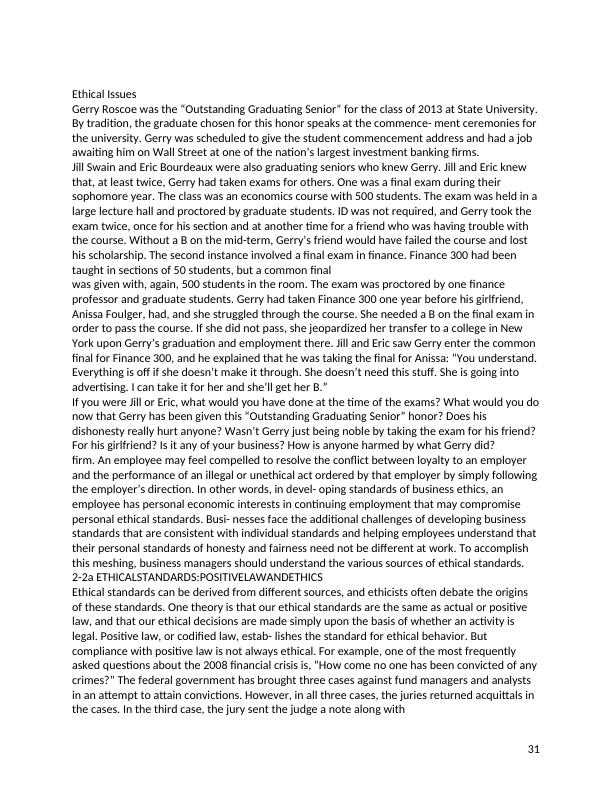
its acquittal that read, “This verdict should not deter the S.E.C. from continuing to investigate the financial industry, review current regulations and modify exist- ing regulations as necessary.” The jury found that there was not criminal conduct because violation of the law, but they called the conduct “appalling.” The three acquittals illustrate that ethical and legal standards are not the same. Conduct may be legal, but not ethical.2-2b ETHICALSTANDARDS:NATURALLAWANDETHICSOthers believe that our ethical standards are derived from a higher source and that they are universal. Often labeled natural law, this school of ethical thought supports the notion that some standards do not exist because of law (and, indeed, may exist despite laws). For example, as discussed in Chapter 1, at one time the United States permitted slavery. Even though the positive law allowed the activity and the standard of positive law considered slave ownership ethical, natural law dictated that the deprivation of others’ rights was unethical32
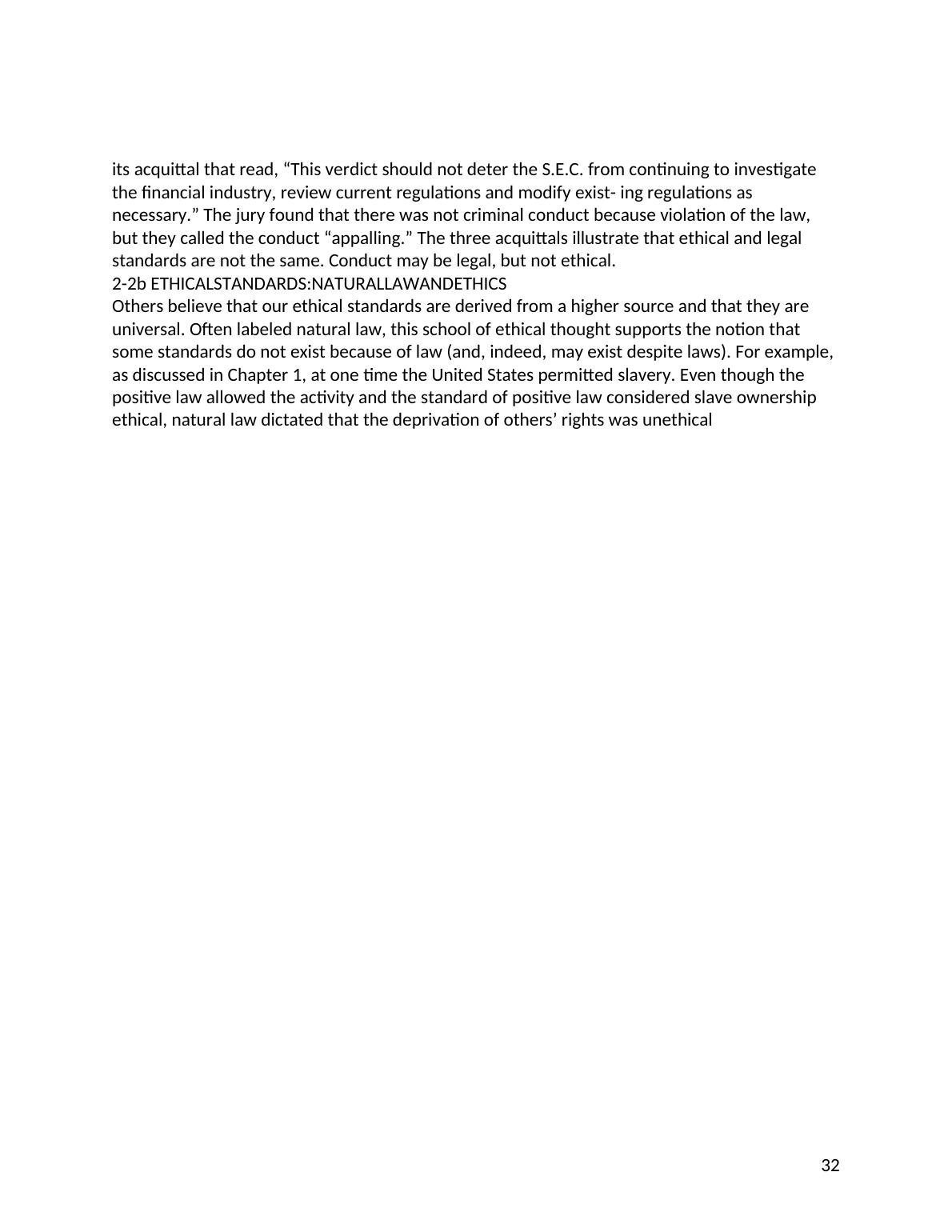
ETHICALSTANDARDS:MORALRELATIVISMANDETHICSMoral relativism (also called situational ethics) establishes ethical standards accord- ing to the situation in which the dilemma is faced. Violation of the law, for example, is permitted if you are stealing to provide food for your starving family. Under moral relativism, adultery is justifiedwhen you are caught in an unhappy marriage, as is the business situation in which you engage in lying to avoid offending a coworker or a customer. Bribery is illegal in the United States, and most companies even have firm policies against accepting gifts, because doing so may create conflicts of interest; but some companies still use a relativist approach and argue that being competitive in international markets is different. They adhere to a philosophy of “When in Rome, do as the Romans do,” following the standards and customs in a given country even though those same behaviors in the United States would be unacceptable and even illegal.2-2d ETHICALSTANDARDS:RELIGIONANDETHICSA final source of moral standards is religious beliefs or divine revelation. The source of standards can be the Bible, the Koran, or any inspired book or writing that is the cornerstone of a religion or faith and believed to have resulted from divine revelation.2-3 What Are the Categories of Ethical Dilemmas?Regardless of the root or source of a company’s or individual’s ethical standards, certain categories of conduct involve ethical issues. The following 12 categories were developed and listed in Exchange, the magazine of the Brigham Young University School of Business.2-3a TAKINGTHINGSTHATDON’TBELONGTOYOUEverything from the unauthorized use of the Pitney-Bowes postage meter at your office for mailing personal letters to exaggerations on travel expenses to the down- loading of music fromthe Internet without authorization to not working your required hours at your job but acceptingfull pay as if you had belongs in this category of ethical violations. A CFO (chief financial officer) of a large electric util- ity reported that, after taking a cab from LaGuardia International Airport to his midtown Manhattan hotel, he asked for a receipt. The cab driver handed him a full book of blank receipts and drove away. Apparently, the problem of accurately reporting travel expenses involves more than just employees.2-3b SAYINGTHINGSYOUKNOWARENOTTRUEA salesperson who tells a potential customer that a product carries a “money-back guarantee” when the salesperson knows that only an exchange is possible has said something that is not true, committed an ethical breach and possibly a violation of the law, and misled the customer. If a car dealer assures a customer that a car has not been in an accident and it has, an ethical breach has occurred. If a homeowner tells a buyer that a home has not had any water damage when, in fact, the base- ment had been flooded, this false statement is an ethical breach too.2-3c GIVINGORALLOWINGFALSEIMPRESSIONSAn urban legend that has circulated among marketing departments around the country is the story of an infomercial that offered two CDs with the hits of the 1980s on them. The infomercialemphasized over and over again, “All songs by33
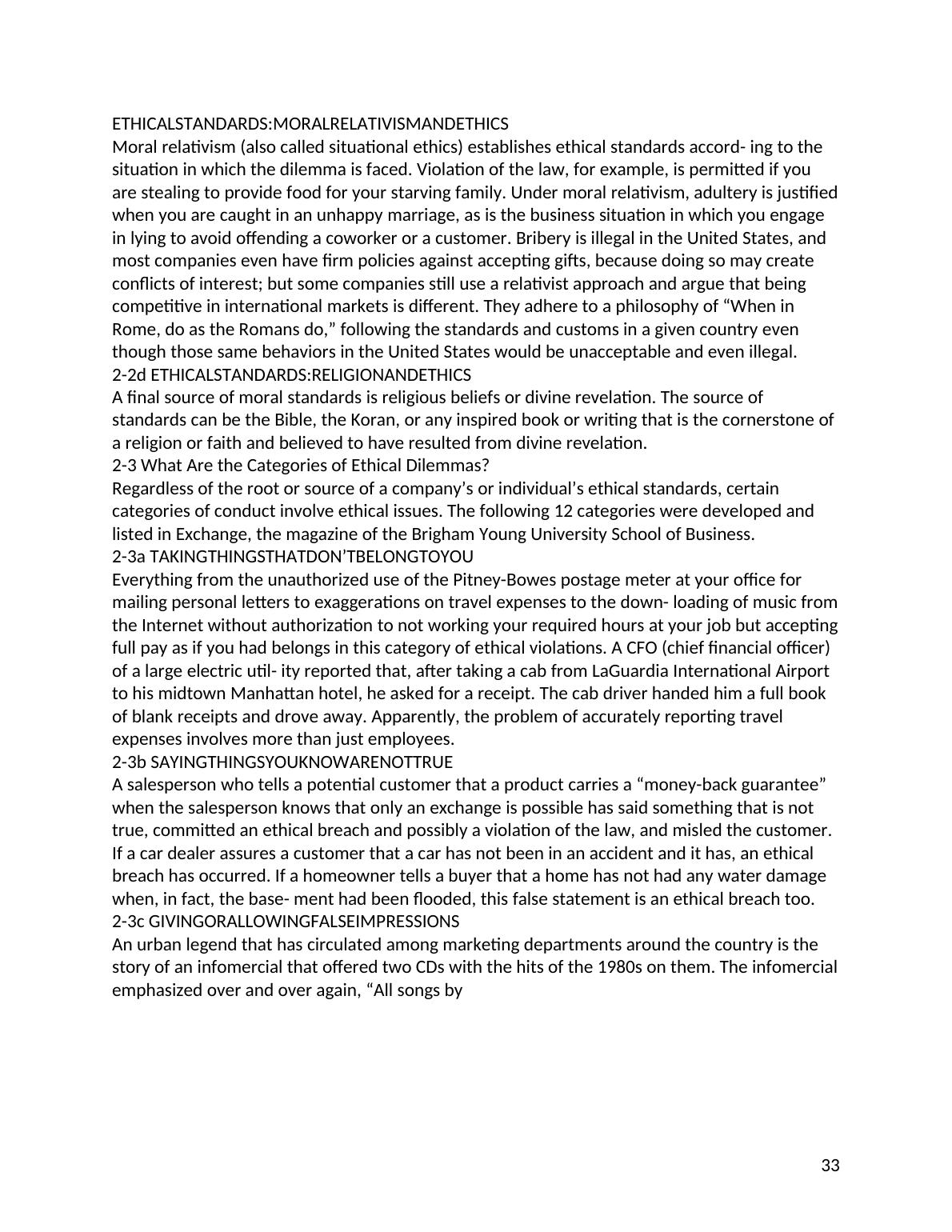
original artists.” Even the CDs carried the line, “All songs by original artists.” When purchasers read the label with a closer eye and listened to the CDs, they discovered that all the songs were performed by one group, a group called “The Original Artists.” While technically true, the advertising left a false impression with customers who assumed they would be buying songs as performed by the recording artists who made the songs popular.2-3d BUYINGINFLUENCEORENGAGINGINCONFLICTOFINTERESTA company awards a construction contract to a firm owned by the father of the state attorney general while the state attorney general’s office is investigating that company. A county official who has the responsibility for selecting the contractor who will build the county’s new baseball stadium travels around the country at the contractor’s expense to view existing stadium sites. The county official should see as many sites and samples of work as there are bidders on the new stadium, but when the contractors pay, there is an ethical issue. A physician researcher whose work concludes that a company’s product is meritorious needs to disclose the consultingfees he receives from that company.All of these examples illustrate conflicts of interest. Those involved in situa- tions such as these often protest, “But I would never allow that to influence me.” That they have to insist they are not or would not be influenced is evidence of the conflict. Whether the conflict can or will influence those it touches is not the issue, for neither party can prove conclusively that a quid pro quo was not intended. The possibility exists, and it creates suspicion.Ethical IssuesThe temptation is remarkable. The run is long. The body screams, “No more!” So, it happened again in the New York City Marathon for 2008. Cheating on this form of a physical final examination became international news when, in 1979, Boston Marathon runner and winner Rosie Ruiz combined her running with a hitch on the train to earn first place. She repeated the ploy in the 1980 Boston Marathon, when her creative approach was discovered.The New York Road Runners Club, the sponsors and managers of the New York City Marathon, disclosed multiple subway riders in their 2008 race on the eve of the 2009 Marathon with the hope of encouraging the 42,000 runners to go the distance, the real distance. For 2008, there were 71 runners disqualified from the race, 46 of them for taking the subway in order to go the distance. The club discovers these free-riders when it investigates what it believes to be extraordinary times for runners who have not been able or should not havebeen able to achieve their recorded times. In at least two situations, the runners who took the subway also took first place in their age categories and deprived the real winners of their Tiffany trophies as well as the thrill of quaffing the elixir of victory on the day of the marathon. The real winners in these age categories from 2008 were not notified of their victories until July 2009 because of the time the investigations take.A spokesperson from the Road Runners Club said that the greatest temptation in the race comes when the runners enter Manhattan via the Queensboro Bridge. That entry to the city is close to Central Park and the finish line, but the race first takes a turn there for another 10 miles into Harlem and the Bronx. Most cheaters sim- ply skip those boroughs and head right into Central Park and the finish line.Are there any laws that govern this situation with the runners? Discuss the ethical issues of the runners. Is anyone really hurt if runners cheat?34
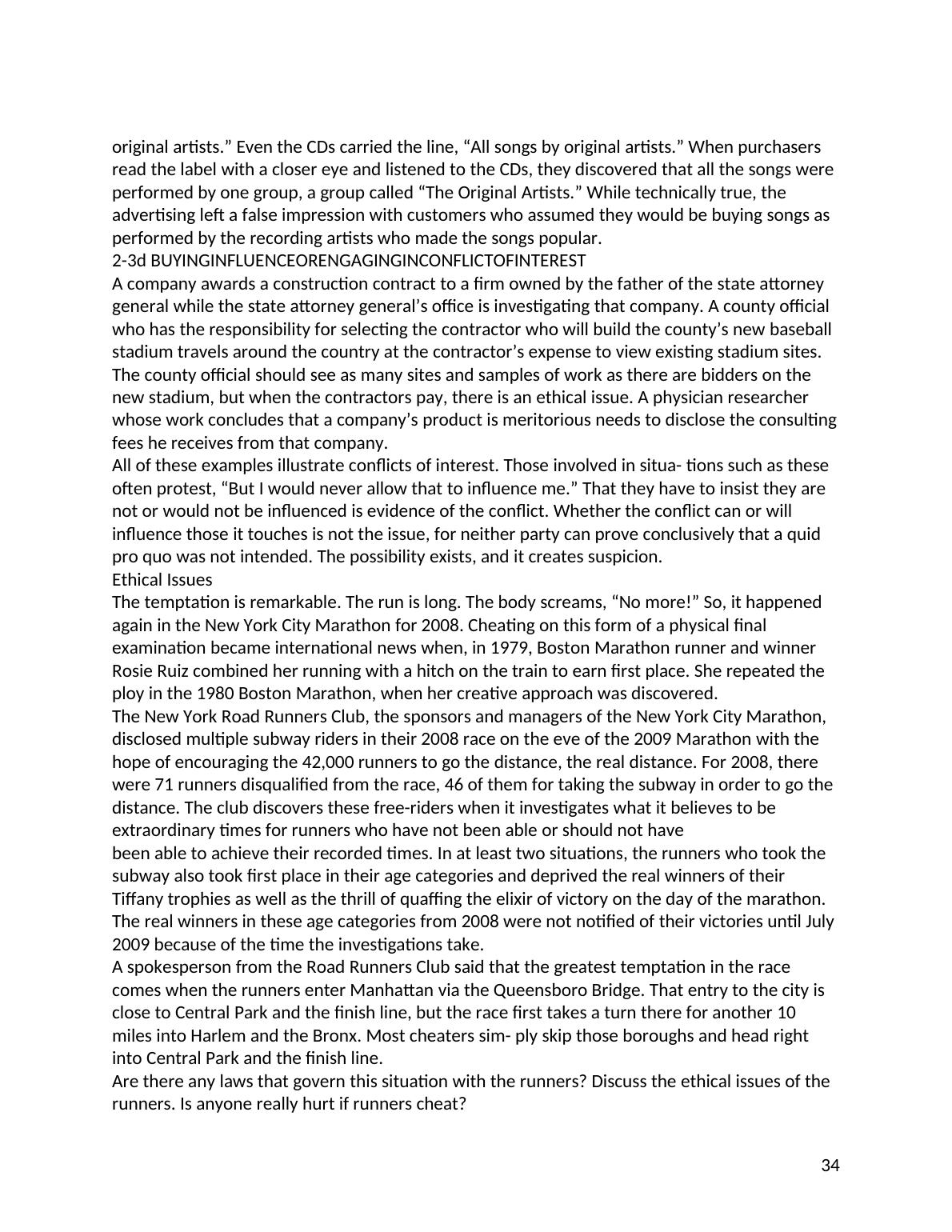
End of preview
Want to access all the pages? Upload your documents or become a member.
Related Documents
Reflective Statement on Employability Skills and Rationalizing Skill Factorslg...
|13
|3380
|63